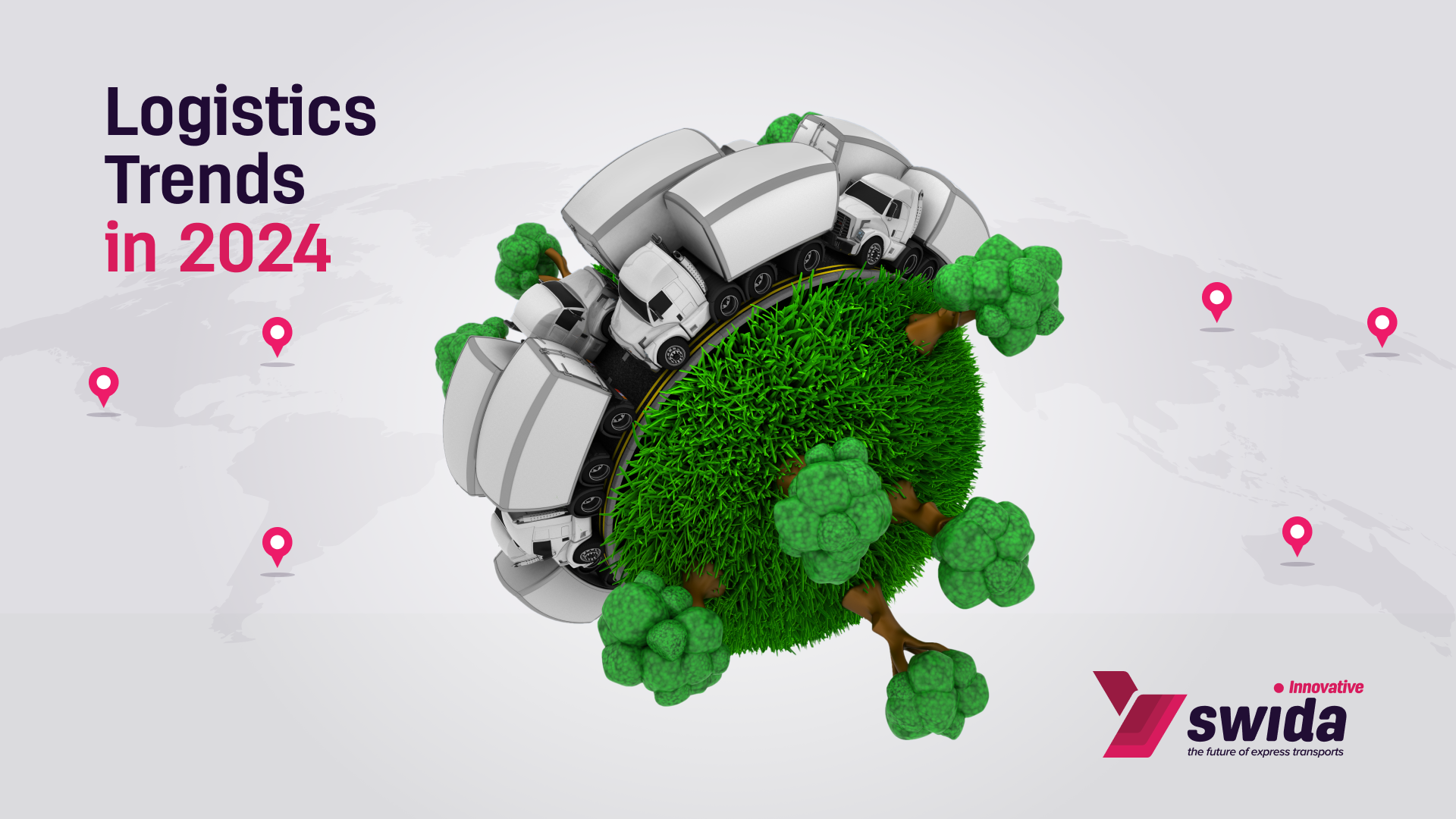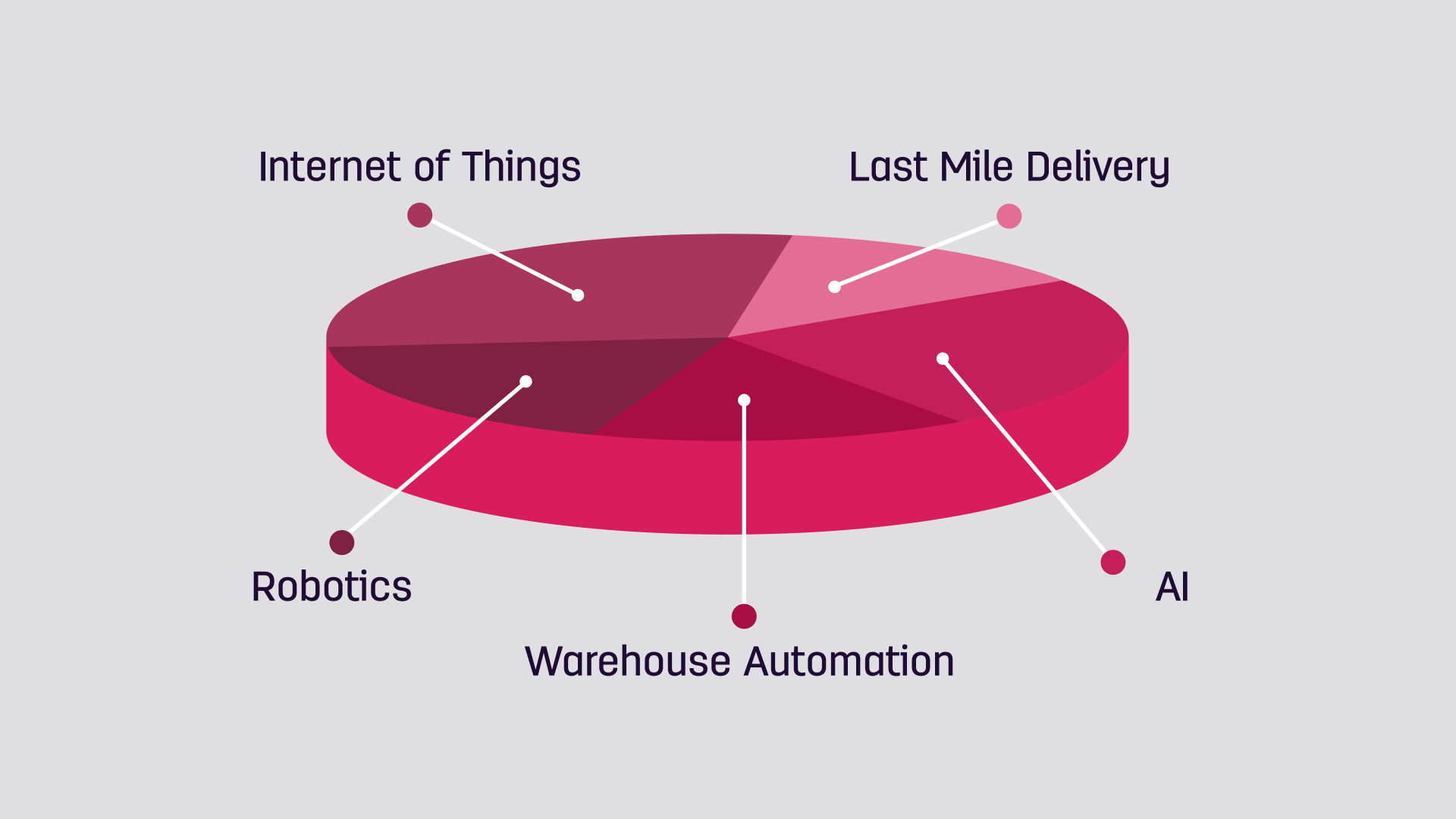20.02.2024
Unveiling the dynamics of logistics: Noteworthy trends to watch in 2024

At SWIDA Innovative, we strive to be innovative and aware of emerging trends. That is why we are bringing you this short piece to cover the key trends to watch out for in 2024. The logistics sphere does not need to be introduced, but it is important to say that it changes the world and constantly introduces new trends that may be tricky to keep up with. So let’s take a closer look at those that are worth mentioning!
1) AI in logistics
Artificial intelligence is making a significant splash in the logistics business, altering it in fascinating new ways.
The Impact of AI in Logistics:
- Streamlined operations: Artificial intelligence automates routine processes such as order processing, inventory management, and route optimisation, freeing up human workers for more complicated duties while increasing productivity.
- Predictive analytics: AI uses massive volumes of data to forecast demand variations, potential disruptions, and resource needs. This enables businesses to manage inventory levels, avoid stockouts, and make educated decisions about supply networks.
- Improved customer experience: AI-powered chatbots and virtual assistants watch customers in real time and respond to their questions quickly, boosting satisfaction.
- Warehouse automation: AI-powered robots are increasingly being utilised to do activities such as sorting, picking, and packing in warehouses, resulting in shorter turnaround times and fewer errors.
Accenture research found that 36% of large, medium and small size organisations have successfully implemented artificial intelligence for supply chain and logistics operations. AI is estimated to increase logistics productivity by more than 20% by 2035. (Accenture, 2022)
Moreover, AI is revolutionising logistics by increasing efficiency, reducing costs, and improving customer experience. While challenges exist, the potential benefits are significant, making AI a crucial driver of success in the modern logistics landscape. (Woods, 2023)

2) Sustainability and Green Initiatives
Sustainability and green initiatives are becoming important in the logistics industry, driven by both environmental concerns and economic benefits. (DHL, 2023)
Companies are focusing their efforts on the following major areas:
Transportation
- Autonomous vehicles: Self-driving trucks and drones for deliveries could optimise routes, save fuel, and lower human error.
- Hyperloop and high-speed rail: Ultra-fast, low-emission transportation solutions that potentially transform long-distance freight travel (McKinsey & Company, 2023)
Warehousing and supply chain
- Smart packaging and tracking: Sensors and connected packaging will collect real-time information on location, condition, and environmental impact.
- Circular economy principles: Focus on reusing and fixing materials, reducing waste, and extending product life cycles.
- Blockchain technology increases transparency and traceability throughout the supply chain, promotes ethical sourcing, and reduces fraud.
Data optimisation
- Advanced analytics and artificial intelligence: Using advanced algorithms, we can predict demand variations, optimise routes in real time, and reduce empty kilometres.
- Collaborative platforms allow logistics businesses to share resources and data to eliminate redundancy and improve overall efficiency.
Policy and Regulation
- Green infrastructure investments include public funding for charging stations, renewable energy sources, and sustainable transportation infrastructure.
- Consumer Preference and Pressure: Growing demand for environmentally friendly products and services is driving organisations to embrace sustainable logistics strategies.
It’s important to note that these are just potential advancements, and their realisation depends on various factors, including technological breakthroughs, economic viability, regulatory environments, and consumer adoption.
3) Real-Time Transport Visibility
Real-time transport visibility (RTTV) is a game-changer for sustainable logistics. By tracking shipments in real-time, businesses can:
- Reduce emissions by optimising routes, minimising empty kilometres, and improving fuel efficiency.
- Improve the supply chain through better inventory management, ecological packaging, and collaborative activities.
- Data-driven decisions: Identify inefficiencies, track progress, and forecast maintenance to cut emissions. (FourKites,2023)
Adopting RTTV is only one step towards sustainable logistics. Combining it with other green projects such as electric vehicles, alternative fuels, and ecological packaging results in a more comprehensive approach to a greener future.
To summarise, these are only a few significant factors influencing the logistics scene in 2024. As technology advances and consumer expectations shift, the industry will surely experience additional innovation and disruption.
References:
- DHL. (2023). Sustainability Trends in Logistics 2024: Discover DHL. DHL Home – Global Logistics and International Shipping United States of America.Sustainability Trends in Logistics 2024 | Discover DHL
- FourKites. (2023a, October 27). Supply Chain Visibility Software. https://www.fourkites.com/supply-chain-visibility-software/
- FourKites. (2023b, October 27). The ultimate guide to real-time transportation visibility platforms. Real-Time Transportation Visibility Platforms (Ultimate Guide)
- Günthner, J. (2023, October 26). The Role of Blockchain in Supply Chain Management (SCM). PALTRON. The Role of Blockchain in Supply Chain Management (SCM) | PALTRON
- McKinsey & Company, M. & C. (2023). Driving the future of Transport.Driving the future of transport | Travel, Logistics & Infrastructure | McKinsey & Company
- More than 60% of companies are only experimenting with AI, creating significant opportunities for value on their journey to AI maturity, Accenture Research finds. Newsroom. (2023, June). More Than 60% of Companies Are Only Experimenting with AI, Creating Significant Opportunities for Value on their Journey to AI Maturity, Accenture Research Finds
- Woods, C. (2023, November 22). How robotics and artificial intelligence are revolutionizing the logistics industry. Locate2u.How Robotics and Artificial Intelligence are Revolutionizing the Logistics Industry

Road cargo transports
Request Transport





